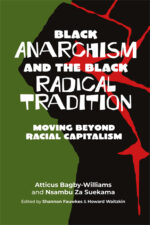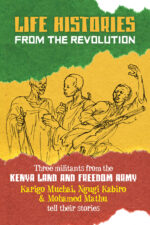|
Preface: The Cult is Dead, Long Live the Cult!
|
xi
|
|
1
|
Obituary for Lenin
KYRGSOC |
1
|
|
2
|
Cabral and Lenin: An Ideological Conversation
Abel Djassi Amado |
4
|
|
3
|
This too is Leninism: Military Marxisms in Africa
Adam Mayer |
8
|
|
4
|
The Wreaths of Lenin
Adrien Minard |
13
|
|
5
|
Me and the Lenin Museum
Aimo Minkkinen |
16
|
|
6
|
Lenin and Mao
Alain Badiou |
19
|
|
7
|
Invocation of Lenin
alejandra ciriza |
23
|
|
8
|
Lenin, Dialectics, and Trans Liberation
Alex Adamson |
26
|
|
9
|
Lenin and Artificial Intelligence
Alex Taek-Gwang Lee |
29
|
|
10
|
My Lenin
Alexander Vatlin |
32
|
|
11
|
Lenin, Liberated Woman of the East
Anara Moldosheva |
34
|
|
12
|
To Blow (Up) The Mausoleum
Anatoli Ulyanov |
37
|
|
13
|
Lenin, Labriola and the Historical Nodes of International
Communism
Andrea Bonfanti |
40
|
|
14
|
Moscow is Just Two Steps Away
Andrés Carminati Ciriza |
43
|
|
15
|
Encountering Lenin in Iceland (and Once in Denmark)
Árni Daníel Júlíusson |
45
|
|
16
|
A Letter to Lenin in Lagos
Baba Aye |
48
|
|
17
|
‘Baking Books’ – Practising Revolutionary Theory Through Bread
Baran Caginli |
53
|
|
18
|
On the Day in Skopje When Anarchists for Lenin Became a Possibility …
Ben Watson |
55
|
|
19
|
Pupils at the Same School, Enemies in 1917: Lenin and Kerensky
Bill Bowring |
58
|
|
20
|
Lenin, the (un)making of a critical legal theorist
Camila Vergara |
61
|
|
21
|
A Feminist-Socialist View of Lenin and the Soviet Revolution
from the Río de la Plata María Cecilia Espasandín Cárdenas |
65
|
|
22
|
Holiday Haunts for Progressive Travellers. Lenin’s Guide to Europe
Chris Read |
68
|
|
23
|
Lenin and Black Power
Christian Høgsbjerg |
73
|
|
24
|
Lenin met Makhno (Or Did He?)
Colin Darch |
76
|
|
25
|
Lenin: Building Hope
Constantino Bértolo |
79
|
|
26
|
Lenin on Women’s Emancipation and Sexuality
Daria Dyakonova |
82
|
|
27
|
Richter and Gus
David McIlwraith |
85
|
|
28
|
Lenin, Psychoanalysis and Free Love
David Pavón-Cuéllar |
88
|
|
29
|
Lenin’s Enduring Influence on the Struggle against Imperialism in Africa
Demba Moussa Dembélé |
93
|
|
30
|
How the Soviet Union Saved the Caribbean without Colonisation
Earl Bousquet |
96
|
|
31
|
Reclaiming Lenin in Iran: Challenging Male Dominance
in the Revolutionary MovementElsaa and La’al |
99
|
|
32
|
Snapshot of the Statues
Esther Leslie |
101
|
|
33
|
“Vilici”: The Theoretician of Hegemony in Antonio Gramsci’s
Prison NotebooksFabio Frosini |
104
|
|
34
|
Lenin’s Vanguardist Party: Reflections on the Nigerian Revolution
Femi Aborisade |
107
|
|
35
|
Back to Zimmerwald
Franco ‘Bifo’ Berardi |
110
|
|
36
|
How I cooked soup with Lenin
Frigga Haug |
113
|
|
37
|
Lenin’s Vision: Awakening of the Masses to Socialist Future
Gal Kirn |
117
|
|
38
|
Lenin, Partisan of the Conjuncture
Gavin Walker |
120
|
|
39
|
Lenin and the Weltgeist: A Philosophical Reflection
George Sotiropoulos |
123
|
|
40
|
Consciously Revolutionary Workers Do Not Fall From Heaven
Gianni Del Panta |
126
|
|
41
|
One of the Creators of the 20th Century
Göran Therborn |
129
|
|
42
|
The Mass Psychology of the Renunciation of Lenin
Gordana Jovanović |
131
|
|
43
|
A Century of Lenin in Tunisia (1924-2024)
Habib Kazdaghli |
134
|
|
44
|
Lenin’s Battles
Helena Sheehan |
139
|
|
45
|
Between the Poetry of Revolution and the Prose of State Formation: Lenin in Memoriam
Himani Bannerji |
142
|
|
46
|
I Do Not Know
Ian H. Birchall |
145
|
|
47
|
Lenin’s Dream
Ian Parker |
148
|
|
48
|
Lenin and Nyerere – A Conversation in the Heavens
Issa Shivji |
151
|
|
49
|
Dictator Lenin vs. Democrat Churchill?
Jacques Pauwels |
156
|
|
50
|
V.I. Lenin and Black Liberation
Joe Pateman |
159
|
|
51
|
Leninists
John Holloway |
163
|
|
52
|
Dear Lenin
J. Moufawad-Paul |
165
|
|
53
|
José Carlos Mariátegui and Lenin
Juan E. De Castro |
168
|
|
54
|
Lenin Never Quoted Lenin
Juan Dal Maso |
171
|
|
55
|
Sasha and Volodya in Sri Lanka
Kanishka Goonewardena |
174
|
|
56
|
With friends like these…
Kaveh Boveiri |
177
|
|
57
|
Lenin and the Living Dialectic
Kevin B. Anderson |
180
|
|
58
|
Too soon! Too late? It’s Time!
Lars T. Lih |
183
|
|
59
|
“All and Sundry”
Leo Zeilig |
186
|
|
60
|
Lenin and the Long Journey to the East: The Case of Qu Qiubai
Luka Golež |
190
|
|
61
|
Lenin’s Way Out
Mahir Ali |
193
|
|
62
|
Lenin in Bakhmut
Marc James Léger |
196
|
|
63
|
The Need to Dream and the Importance of (Re)Believing in Lenin
Marcela Magalhães |
199
|
|
64
|
Lenin and the deep history of Inner Eurasia
Marcus Bajema |
202
|
|
65
|
Ecological Leninism and Proletarian Agency
Matt Huber |
206
|
|
66
|
Lenin Against Stalin: The National Question
Michael Löwy |
209
|
|
67
|
Lenin and the Invention of Politics
Michael Neocosmos |
212
|
|
68
|
President Putin is somewhat right
Michał Kozłowski |
215
|
|
69
|
Hiding
Minna Henriksson |
218
|
|
70
|
Thinking (in) the conjuncture
Natalia Romé |
222
|
|
71
|
Eulogy of Lenine by a Cuban Marxist
Natasha Gómez Velázquez |
225
|
|
72
|
Lenin Will Rise Again Like a Phoenix
Naweed |
228
|
|
73
|
Lenin on the Moon
Nicholas Bujalski |
231
|
|
74
|
Lenin and Great Russian Chauvinism
Nigel C. Gibson |
235
|
|
75
|
The Star of Lenin Still Shines
Olya Murphy |
239
|
|
76
|
Lenin on the Buses
Owen Hatherley |
242
|
|
77
|
Lenin: Responding to Catastrophe, Forging Revolution
Paul Le Blanc |
247
|
|
78
|
The Three Tragedies of Vladimir Ilyich Lenin
Peter Hudis |
250
|
|
79
|
Lenin in Thailand
Puangchon Unchanam |
253
|
|
80
|
Six Links of Leninism
Redrock |
256
|
|
81
|
Building Strength in the Weakest Link: Lenin and the Philippines’ Internationalist Solidarity
Regletto Aldrich Imbong |
259
|
|
82
|
Against the Capitalist Scaremongers from 1917 to 2024, 2025, etc.
Richard Gilman-Opalsky |
262
|
|
83
|
Lenin and Me
Ronald Grigor Suny |
265
|
|
84
|
Whatever Would Lenin Have Said? – We Owe Him an Answer!
Ronald Matthijssen |
268
|
|
85
|
Lenin on Women and Social Reproduction … in Vietnam
Ly Hoang Minh Uyen (Sally Mju) |
273
|
|
86
|
Lenin on Imperialism: Wrong But Also Right
Sam Gindin |
276
|
|
87
|
Lenin as Method
Sandro Mezzadra |
280
|
|
88
|
‘Lenin’ is the Name of a Man
Sara Katona |
283
|
|
89
|
On the Eve of Revolution, When Ilyich Visits Rosa…
Sevgi Doğan |
287
|
|
90
|
Publishing as Scaffolding
Sezgin Boynik |
291
|
|
91
|
Words: 26 October 1917
Sheila Delany |
294
|
|
92
|
Lenin at His Worst… Or at His Best?
Slavoj Žižek |
295
|
|
93
|
What to Do With Chto Delat?
Soma Marik |
297
|
|
94
|
The Finest Statue of Lenin Ever Made
Stefan Gužvica |
303
|
|
95
|
Lenin’s “Left-Wing” Communism and ISO-Zimbabwe in the late 1990s working-class struggles
Antonater Tafadzwa Choto |
306
|
|
96
|
Lenin’s Legacy – An Alternative to Capitalism
Tamás Krausz |
309
|
|
97
|
Lenin, Theorist of the Integration of the National, Colonial
and Social QuestionsThierno Diop |
312
|
|
98
|
The Vanguard Question
Will Cameron |
315
|
|
99
|
What Lenin Did Not Say
Wladislaw Hedeler |
318
|
|
100
|
Lenin’s Death in China
Xianxin Yuan |
320
|
|
101
|
Eleven Theses on the Contemporaneity of Tovarish Lenin
Yağmur Ali Coşkun |
323
|
|
102
|
Lenin of February 24th
Yevgeniy Fiks |
327
|
|
103
|
“Truth [is] Not in ‘Systems’”: Our Politics of the Event
Yutaka Nagahara |
328
|
|
104
|
Lenin’s Time
Jodi Dean |
333
|
|
About KickAss Books
|
336
|
|
About Daraja Press
|
337
|
|
Bibliography
|
338
|










Vesa Oittinen
On the 100th anniversary of his death, Lenin seems to have fallen in oblivion — and however, when one takes a look at the present situation of the world, his ideas are more needed and more actual than ever. Almost nothing about what he wrote — on politics, on philosophy, on imperialism, on the right of the nations to self-determination — has become obsolete. On the contrary, many questions have become, if possible, more acute than during his lifetime. This book gives an excellent cross-section of what Lenin thought and wrote, and explains his actuality. — Vesa Oittinen, Professor emeritus, Aleksanteri Institute, University of Helsinki, Finland
Ray Bush
The editors of this collection on Lenin and his lasting influence, have collated a simply wonderful and critically engaged celebration of the 20th century’s most significant political actor. It’s difficult to summarise the 104 contributions that include poems, love letters, imaginary dreams, fiction and ‘dialogue’ with Lenin as well as theoretical treaties and political manifestos. The collection provides insight and dynamic interpretations of the range of many of Lenin’s contributions to political struggles that shaped revolutionary transformations for generations and continues to do so. Ray Bush in ROAPE
Ian Parker
The book, edited by Hjalmar Jorge Joffre-Eichorn and Patrick Anderson, has an unsettling title “Lenin: The Heritage We (Don’t) Renounce,” which basically boils down to an affirmation of Lenin against all those who would want to denounce him, whether that is outright reactionaries who have never actually read him to former revolutionaries who now conveniently disown him. Over a hundred authors from (nearly) every corner of the world pit themselves against mis-readings and misunderstandings of Lenin in short essays, most of which are bite-sized and some of which are more difficult to digest. … This is an unashamedly partisan book, on the side of the exploited and oppressed and showing that Lenin, for all his faults, was too. The editors tell us that “The shamelessly immodest purpose of this book is to be an active part of this process of communisting; in our case, an unapologetically Leninist one”. It is a brave project, time-consuming, and now it takes time to read it – this is a big book – but worth it if we are to take Lenin to heart and liberate ourselves. — Ian Parker, Two, three, many Lenins https://anticapitalistresistance.org/two-three-many-lenins/
Paul Buhle
“The purposes of this book, while certainly not lacking in humor, are entirely serious: the recall of a real revolutionary Lenin from under the layers of defamation and distortion. The 101 (!) authors radiate good will, hope and ironic cheer in what has been widely and for good reasons considered a hopeless time. So much is said, from so many standpoints … and so many points are scored, more than could be discussed in any review shorter than the book itself.” – Paul Buhle – Portside
Kevin Crane
… a wealth of strong pieces came from the Global South contributors talking about Lenin’s unique contribution to the socialist analysis of imperialism and how this relates to the struggle against neo-colonialism today, particularly in African countries. Kevin Crane https://www.counterfire.org/article/lenin-the-heritage-we-dont-renounce-book-review/
Doug Miller
I can’t tell you how much I have enjoyed the book you recommended from Daraja Press. Lenin: The heritage we (don’t) renounce. It is wonderful read and so full of varied and topical visions. It has also led me to learn more about Nina Simone’s revolutionary side and Marx’s poetry.
It is one of the few books that has gripped me and kept me reading over the last months, especially when all my other concentration has been exhausted by the relentless Israeli massacre of the Palestinians. — Montreal, Québec
“Me too, I snack on it, finding thoughts and information that lighten my days,” writes Ole Gjerstad, Gatineau, Québec
Ole Gjerstad
Comrades,
Whether you’re nostalgic, or retired with too much time on your hands, or actually
struggling to get a handle on the world in this violently contested age of imperialism,take a look at this book — Tovarich Vladimir reconsidered from all corners of the world, especially the Global South. Even the artwork is great.
Stefan Bollinger
“A compelling insight into the thought and practice of those seeking to work with the legacy of the great master today. […] This anthology should be kept close at hand, so that the variety of possible consequences of Lenin’s work can be recalled again and again.” —Stefan Bollinger, Z. – Zeitschrift Marxistische Erneuerung
Bafto Sarbo
“Renaissance in a hundred texts. In Lenin: the Heritage we (Don’t) Renounce, 100 authors from over 50 countries write about Lenin and what he or Leninism has meant to them, to historical figures, political movements or academic fields. […] What runs through the book is a consistently positive perspective on Lenin: a perspective that is not an expression of dogmatic and uncritical Leninism, but rather one intended to act as a counterweight to anti-Leninism on the left.” — Bafto Sarbo, analyse & kritik, Zeitung für linke Debatte & Praxis
Daniel Hackbarth
“Lenin – The Heritage We (Don’t) Renounce is a highly unusual volume with inspiring material for repeated reading.” — Daniel Hackbarth, WOZ – Die Wochenzeitung
D-Econ Seasonal Alternative Reading List 2024- Part I
… we have been reading a critical commemoration of the legacy of Vladimir Lenin. They make for some really inspiring reading! … Through 104 contributions, the book is a vast and exciting revisiting of Lenin’s legacy and the relevance of his thinking for understanding contemporary times. The topics that the chapters touch on are vast, the contributors are diverse, and the form of writing varies from poetry, skits, fictional writing, to academic and journalistic contributions. D-Econ Seasonal Alternative Reading List 2024- Part I
Sean Sheehan
Another anniversary, arising from Lenin’s year of birth, has prompted Lenin 150 (Samizdat), a collection of writings and photographs that explore the political footsteps of Lenin worth following today. The contributors are an exhilaratingly mixed set of activists and academics and they write in various styles, from the lyrical and personal to the discursive and theoretical. The book’s origins can be traced to Kyrgyzstan – home to more surviving Lenin statues than anywhere besides Belarus – but its spirit is internationalist and its laudable regard for approaching Lenin from different perspectives is even more pronounced in its second edition. As a witty, relevant, inspirational and superbly sane collection of words and pictures, this is a book that requires two copies: one to keep and the other to present to a friend as a gift. In the footsteps of Lenin
Joel Wendland-Liu
In an era when the people who dominate the world seem more inclined to bring about the end of humanity rather than to end capitalism’s inherent brutality, Lenin’s theoretical mind, practical organizing talents, and commitment to working-class leadership are needed more than ever. While this book does not try to give a political biography of Lenin or deliver a definitive perspective on his thought, it does open many imaginative doors to understanding Lenin’s global legacy.
The diverse contributions in Lenin: The Heritage We (Don’t) Renounce illuminate Lenin’s enduring influence on Marxist thought and its application to various global contexts. The humanizing perspectives and historical overviews offer valuable insights into Lenin’s principles and their relevance in contemporary struggles against fascism, neoliberalism, and imperialism.- Joel Wendland-Liu
Darryl Horan
At its core, Lenin: The Heritage We (Don’t) Renounce stands as a rallying call for modern
revolutionaries. A century after his death, there are still lessons to be learned and important
questions to engage with Lenin on. His revolutionary insights are as necessary today as they
were in Lenin’s own day as we struggle under the same capitalist system that hurls us towards
catastrophe and leaves us in desperate need of liberation. To mark the centenary of his death,
the book is a collection of more than a hundred contributions from activists, academics and
authors who feel a debt to Lenin. Its contributors blend the political and the personal. Many of
its pieces don’t just pull directly from Lenin but examine how he influenced the given writer’s
insights and political developments particularly through the ‘learned experimentally’ that
defined the Bolshevik project. The books contributions are wide ranging and thought
provoking. It is rich in pieces on imperialism, socialist feminism, and Lenin’s philosophical
insights. Some of its most impressive elements are readings of Lenin which tackle questions of
black power, trans and queer liberation and iconography. Darryl Horan: Irish Marxist Review, August 2024
Steve Ellner
Many of the essays in the book laud Lenin for the principled positions he assumed in the context of the early twentieth century on the issues of race, ethnicity, gender, war and Eurocentrism. The book also illustrates the wide range of topics that Lenin addressed. For instance, one of the book’s essayists, Matt Huber, uses the term“ecological Leninism” to refer to the implementation of Lenin’s political strategy to face the environmental crisis. While some Marxists question the current applicability of important aspects of Leninism, the writers in this book view Lenin as an inspiration and a guide both for themselves and the political movements in their respective countries.—Steve Ellner, Science & Society, 2025, Vol. 89(3) 400–405